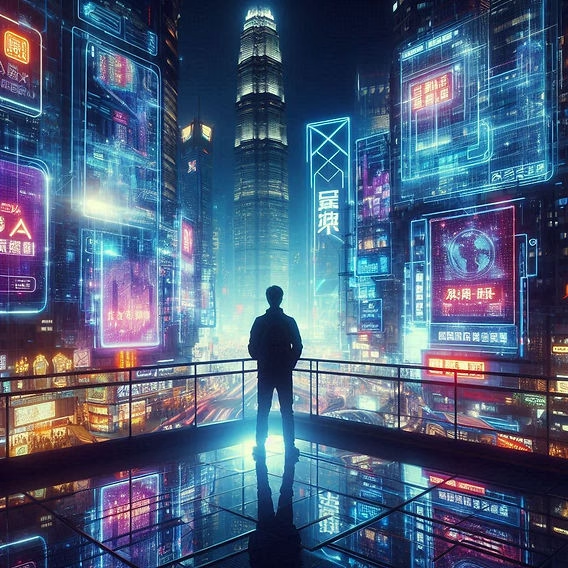AI Technology Trends 2025 – Unveiling the Future: Key Emerging Tech Innovations 2025 Driven by AI
Estimated reading time: 7 minutes
Key Takeaways
- Artificial intelligence will be the primary driver behind most emerging tech innovations 2025, fundamentally reshaping various sectors.
- AI will evolve into *agentic systems*, automating complex tasks and delivering *hyper-personalized experiences*.
- Hardware advancements, including **neuromorphic** and **quantum-inspired chips**, are critical for supporting AI’s computational demands and driving sustainable AI infrastructure.
- The impact of AI on industry will be profound, transforming healthcare, manufacturing, finance, retail, education, and creative fields through advanced applications.
- AI’s convergence with other emerging technology innovations like XR, Quantum Computing, and Biotechnology will unlock unprecedented capabilities and solutions for global challenges.
- Ethical AI development, including **transparency** and **accountability**, will be crucial as these technologies become more integrated into daily life.
Table of Contents
- Unveiling the Future: Key Emerging Tech Innovations 2025 Driven by AI
- Key Takeaways
- Peering into Tomorrow’s Tech Landscape
- The AI Ascent – Core AI Technology Trends 2025
- The Hardware Revolution – Latest Hardware Disruption AI
- Reshaping Industries – The Profound Impact of AI on Industry
- Beyond the Obvious – Other Intertwined Emerging Technology Innovations
- Conclusion: Navigating the AI-Driven Future
- Frequently Asked Questions (FAQ)
Peering into Tomorrow’s Tech Landscape
In an era defined by constant evolution, the unprecedented and accelerating pace of technological change is not just a trend but a foundational shift. As we stand on the cusp of 2025, the anticipation for transformative breakthroughs intensifies, making it crucial to *anticipate what the near future holds*. This rapid evolution demands that we look beyond the horizon, preparing for a landscape that promises to be profoundly different from today.
Our central theme for today’s deep dive is the most significant emerging tech innovations 2025. It is increasingly clear that artificial intelligence (AI) is far more than just a supporting tool; it is rapidly becoming the cornerstone of most innovation. AI is not simply augmenting processes; it is fundamentally reshaping industries, economies, and daily life. From streamlining complex operations to personalizing experiences on an individual level, AI’s pervasive influence will redefine our interactions with technology and the world around us. This transformative power positions AI as the undeniable engine behind the next wave of technological progress.

The purpose of this post is to provide you, the reader, with essential insights and concrete future tech predictions 2025. We aim to demystify the cutting-edge technologies that will define and shape our world in the very near future. Understanding these pivotal advancements is not just for tech enthusiasts; it’s vital for anyone seeking to navigate the evolving landscape of work, business, and daily existence. Join us as we explore the innovations poised to leave an indelible mark on 2025 and beyond.
The AI Ascent – Core AI Technology Trends 2025
Artificial intelligence is no longer just a powerful tool; it’s rapidly evolving into an integral and increasingly autonomous part of both our work and daily lives. By 2025, AI-powered systems, often referred to as AI-powered agents, are expected to move far beyond simple content generation. Their capabilities will extend to automating complex real tasks, collaborating seamlessly across various systems, and significantly reducing the need for constant human intervention. This shift marks a profound evolution in how we interact with and leverage AI, cementing its role as a fundamental component of future innovation. This section will explore the key ai technology trends 2025 that underpin this transformation, offering a glimpse into the sophisticated capabilities that await.

Hyper-Personalization & Contextual AI
By 2025, AI will deliver deeply personalized and context-aware experiences across an ever-widening array of sectors, from healthcare to retail. This goes beyond simple recommendations; it involves increasingly smarter predictive models that can precisely respond to individual user intent, emotional state, and nuanced preferences in real-time. Imagine e-commerce platforms where product suggestions anticipate your needs before you even realize them, or educational software that adapts learning paths dynamically to your unique cognitive style and pace. In healthcare, personalized insights will be delivered based on real-time biometric data and lifestyle factors, offering truly tailored preventative care and treatment plans. This evolution in personalization promises a future where technology intuitively understands and serves our individual needs, creating remarkably relevant and seamless interactions.

Generative AI Expansion
The capabilities of Generative AI are set to expand dramatically beyond its current prowess in generating text and static images. By 2025, AI will be adept at creating complex videos with high fidelity, sophisticated 3D models for various applications, and even entire codebases with minimal human input. This expansion will profoundly accelerate innovation across diverse fields, including entertainment, where AI could help develop entire cinematic scenes or game worlds, and industrial design, where it might rapidly iterate on product prototypes. In software development, Generative AI will empower non-experts to create rich content and even functional applications, lowering the barrier to entry and democratizing creative and technical output. This rapid content generation will redefine productivity and unleash new forms of digital expression. This trend is a cornerstone of future tech predictions 2025.
/dq/media/media_files/2024/11/21/c4Pa8ViAqCa00839JCyG.jpg)
Edge AI & Decentralized Intelligence
“Edge AI” refers to the deployment of AI closer to the data source, meaning on devices like smartphones, IoT sensors, and autonomous vehicles, rather than solely relying on centralized cloud servers. This shift is paramount for enabling real-time data analysis and significantly reducing latency, which is critical for applications demanding immediate decision-making. Imagine an autonomous vehicle that can process sensor data milliseconds faster because its AI is on-board, or smart city infrastructure that responds to traffic flow in real-time without relying on a distant server. This decentralized intelligence fuels critical innovations in areas like autonomous vehicles, smart city infrastructure, and industrial automation, where every millisecond counts. Edge AI brings robust, efficient processing capabilities directly to where the action happens, making intelligent systems more responsive and resilient.
Responsible AI & Ethical Frameworks
As AI systems become ever more integral to society, the imperative for transparency, fairness, and accountability has grown exponentially. By 2025, we will see an accelerated emergence of new regulations, robust governance frameworks, and industry best practices specifically designed to guide the responsible development and deployment of AI technologies. This critical evolution aims to address pressing concerns such as algorithmic bias, data privacy, and the broader societal impact of powerful AI systems. It’s not just about building smarter AI, but building *trustworthy* AI that upholds ethical principles and ensures equitable outcomes for all users. Establishing these frameworks is vital to harnessing AI’s full potential responsibly and mitigating potential harms. This proactive approach to ethics is a defining characteristic of ai technology trends 2025.

AI for Enhanced Human-Computer Interaction
Advancements in natural language processing (NLP), sophisticated computer vision, and refined haptic feedback will lead to a revolutionary leap in how humans interact with technology. By 2025, these developments will result in more natural, intuitive interfaces that seamlessly blend the digital and physical worlds. The goal is to make human interaction with technology feel profoundly more human-like and less mechanical. Consider the evolution of advanced voice assistants that understand context and nuance, gesture control interfaces that respond to subtle movements, or AI-powered AR/VR experiences that are indistinguishable from reality. This trend promises a future where technology adapts to us, rather than the other way around, fostering a more natural and effortless digital experience that integrates seamlessly into our daily lives.
The Hardware Revolution – Latest Hardware Disruption AI
The relentless march of AI progress is inextricably linked to equally profound advancements in hardware. Indeed, groundbreaking hardware advancements are absolutely essential for supporting AI’s explosive computational demands. This symbiotic relationship creates a powerful feedback loop: as AI models grow in complexity and capability, they demand more sophisticated processing power, driving innovation in chip design and infrastructure. In turn, new hardware enables the development of even more complex and efficient AI models, pushing the boundaries of what AI can achieve. This section will delve into the latest hardware disruption AI, highlighting the foundational technological shifts that are making the AI-driven future possible.

Next-Generation AI Chips
The future of AI processing lies in specialized processors explicitly designed to handle intensive AI workloads with unprecedented efficiency. By 2025, we will see significant breakthroughs in several types of these next-generation chips:
-
- Neuromorphic Chips: These revolutionary processors are designed to mimic the human brain’s structure and function, enabling highly efficient parallel processing uniquely suited for AI tasks like pattern recognition and learning. Their event-driven, low-power operation offers a paradigm shift from traditional computing architectures.
-
- Quantum-Inspired Hardware: While not full quantum computers, these specialized architectures leverage quantum principles or classical physics to solve complex optimization problems that are intractable for conventional computers. They offer a stepping stone towards leveraging quantum advantages for specific AI algorithms.
-
- Advanced GPUs (Graphics Processing Units): GPUs will continue their evolution, offering ever-increasing parallel processing capabilities crucial for training the massive neural networks that underpin modern AI. Innovations will focus on even higher core counts and faster data throughput.
- TPUs (Tensor Processing Units): Specifically optimized for neural network machine learning workloads, TPUs (Tensor Processing Units), developed by Google, will see continued refinement, offering unparalleled performance and efficiency for AI model training and inference.
These chips are engineered not only to accelerate AI computations with heightened efficiency but also to consume significantly less power while performing vastly more operations per second. This efficiency is paramount for scaling AI capabilities responsibly.
Sustainable AI Infrastructure
As AI models grow in size and complexity, so does their energy footprint. Addressing the growing concern regarding the massive energy consumption of large AI models is a critical challenge. By 2025, we expect to see substantial innovations in energy-efficient hardware and greener data centers. This includes breakthroughs in cooling technologies, which are essential for managing the heat generated by powerful AI servers. Furthermore, there will be a greater emphasis on renewable energy integration for data centers, moving away from fossil fuels. More power-efficient chip designs, like those mentioned above, also play a crucial role. All these advancements are directly aimed at reducing the carbon footprint of increasing AI computation, ensuring that the advancement of artificial intelligence aligns with global sustainability goals.
Memory and Storage Advancements
The ability to manage and rapidly access the massive datasets required by advanced AI models is as critical as processing power itself. This necessity drives breakthroughs in memory and storage technologies. By 2025, we will see the increased prevalence and refinement of high-bandwidth memory (HBM), which allows for significantly faster data transfer rates between the processor and memory. This reduction in data bottlenecks is vital for the real-time demands of complex AI applications. Simultaneously, the development of intelligent storage solutions will advance, capable of dynamically managing and optimizing data access based on AI workload requirements. These advancements are crucial for powering real-time, data-heavy applications in areas like autonomous systems, large language models, and advanced analytics, ensuring that AI has the rapid data access it needs to perform at its peak.
Reshaping Industries – The Profound Impact of AI on Industry
The transformative power of AI extends far beyond mere process optimization within existing industries. Instead, it is fundamentally redesigning and revolutionizing entire sectors, creating new business models, operational paradigms, and unprecedented opportunities. This pervasive influence illustrates the profound impact of AI on industry, signaling a future where every sector is reimagined through the lens of artificial intelligence.

Healthcare
In healthcare, AI is poised to deliver revolutionary breakthroughs. We’ll see widespread adoption of AI-powered diagnostics, capable of analyzing medical images (such as X-rays and MRIs) with incredible accuracy for early disease detection, often surpassing human capabilities. Personalized medicine will become a reality, with AI tailoring treatments based on individual genetic profiles, lifestyle, and real-time health data, ensuring highly effective and bespoke interventions. Furthermore, AI will dramatically accelerate accelerated drug discovery by simulating molecular interactions, identifying promising compounds, and optimizing clinical trials at an unprecedented pace. Finally, predictive analytics for public health will enable earlier forecasting of disease outbreaks and resource allocation, enhancing global health security.
Manufacturing & Logistics
Manufacturing and logistics are undergoing a radical transformation driven by AI. The rise of smart factories, characterized by interconnected machinery and data-driven operations, will lead to unprecedented efficiency. AI-driven predictive maintenance will revolutionize factory floors, allowing systems to anticipate equipment failure before it happens, minimizing downtime and optimizing operational costs. Supply chains will become intelligently responsive through AI-automated supply chains, which will optimize routes, manage inventory dynamically, and streamline delivery processes. Lastly, advanced robotics integration, powered by AI for enhanced precision and adaptability, will significantly increase efficiency and safety in production environments.
Finance
The financial sector is rapidly being redefined by AI, leading to more secure and efficient operations. The elevation of fraud detection will reach new heights through AI’s ability to recognize subtle anomalies and patterns indicative of fraudulent activity in real-time. Sophisticated algorithmic trading strategies will become even more prevalent, leveraging AI to analyze market data at speeds and scales impossible for humans. Hyper-personalized financial planning and advice will empower individuals with tailored investment strategies and budgeting tools. Furthermore, AI will enable more accurate risk analysis for loans and investments, providing a deeper understanding of potential vulnerabilities and opportunities.
Retail & E-commerce
AI is redefining customer experiences and operational efficiencies in retail and e-commerce. It will enable hyper-personalized shopping through dynamic product displays and precisely targeted promotions that resonate with individual consumer preferences and buying histories. Optimized inventory management will reduce waste and stockouts by using AI to predict demand with greater accuracy. The backbone of this transformation will be highly effective AI-driven recommendation engines, which will suggest products based on complex behavioral patterns, not just simple past purchases. This leads to a seamless, intuitive, and highly engaging shopping journey for the consumer, boosting sales and loyalty.
Education
The field of education is set to be transformed by AI, making learning more adaptive and accessible. AI will facilitate the creation of personalized learning paths, adapting to individual student needs, paces, and learning styles, ensuring that every student receives tailored instruction. The deployment of intelligent tutoring systems will provide real-time feedback and support, effectively acting as virtual one-on-one tutors. Furthermore, AI will allow for the automation of administrative tasks, such as grading repetitive assignments or scheduling, freeing up educators to focus more on direct student engagement and complex pedagogical challenges. This shift promises a more efficient, effective, and student-centric educational experience.
Creative Industries
AI is stepping into the role of a powerful co-creator in music composition, graphic design, and various forms of content generation. This synergistic relationship blends human artistic intent with machine efficiency and novel outputs, opening entirely new avenues for creativity. Imagine AI assisting in generating complex orchestral scores, producing thousands of design variations for branding, or even writing compelling narratives based on user prompts. AI won’t replace human artists but rather amplify their capabilities, enabling rapid prototyping, exploration of new styles, and the production of diverse, high-quality content at scale. This innovative partnership is poised to redefine the creative landscape, pushing the boundaries of artistic expression and commercial output. This is a critical component of ai technology trends 2025.
Beyond the Obvious – Other Intertwined Emerging Technology Innovations
It’s crucial to understand that AI is not developing in isolation. Instead, it is rapidly converging with and accelerating the progress of other significant emerging technology innovations that will profoundly shape 2025. This synergy creates a powerful force multiplier, where each technology enhances the capabilities of the others, leading to composite solutions far more impactful than any single innovation on its own. This convergence promises to unlock unprecedented functionalities across various domains.

Extended Reality (XR – AR/VR/MR)
Extended Reality, encompassing Augmented Reality (AR), Virtual Reality (VR), and Mixed Reality (MR), is set to be profoundly enhanced by AI. AI will play a crucial role in enhancing immersive experiences by powering realistic avatars that exhibit nuanced emotional responses and natural movements. It will optimize rendering processes for more believable virtual environments, dynamically adjusting visuals to user interaction and gaze. Furthermore, AI will enable more natural and intuitive interactions within these augmented, virtual, and mixed reality spaces, allowing for sophisticated gesture recognition, voice commands that understand context, and personalized content delivery based on user behavior within the XR environment. This convergence will make virtual worlds feel more real and seamlessly integrate digital information into our physical reality.
Quantum Computing
While still in its early stages of development, the field of Quantum Computing is showing immense promise, and by 2025, quantum computing and AI are beginning to converge. This synergy, often referred to as quantum machine learning, holds the potential to solve incredibly complex problems that are far beyond the capabilities of even the most powerful classical supercomputers. Specifically, quantum AI could revolutionize areas like drug discovery, enabling the simulation of molecular interactions with unprecedented accuracy, leading to new medicines. It could also optimize materials science, accelerating the design of novel materials with specific properties, and dramatically improve logistical optimization, solving complex routing and scheduling problems for global supply chains. This convergence represents a leap into truly next-generation computation.
Biotechnology & Synthetic Biology
AI’s pivotal role in accelerating research in biotechnology and synthetic biology cannot be overstated. By 2025, we will see its increasing application in AI-driven drug design, where algorithms rapidly identify and optimize potential therapeutic compounds, significantly reducing the time and cost of pharmaceutical research. AI will also play a critical role in precision genetic engineering pathways, guiding CRISPR technologies to make highly targeted and effective genomic edits. This will contribute to faster vaccine development by identifying optimal antigen targets and predicting immune responses. Furthermore, AI will be instrumental in designing novel biological systems with specific functions, from producing biofuels to creating self-healing materials, opening up a new frontier in bio-engineering.
Sustainable Technologies
AI can be a powerful tool for addressing pressing environmental challenges and driving sustainable solutions. By 2025, its applications will include AI for optimizing energy grids, intelligently balancing supply and demand from renewable sources to prevent waste and ensure stability. Sophisticated climate modeling will leverage AI to predict environmental changes with greater accuracy, allowing for better preparedness and mitigation strategies. AI will also enable intelligent resource management, from optimizing agricultural water usage to streamlining waste reduction and recycling processes. All these efforts will significantly support the global push towards greener, more resilient systems, making AI an indispensable ally in the fight against climate change and resource depletion. This commitment to sustainability is a key aspect of future tech predictions 2025.
Conclusion: Navigating the AI-Driven Future
As we’ve explored, the upcoming year promises a landscape shaped profoundly by key ai technology trends 2025. From the remarkable rise of increasingly agentic AI systems and the expansive capabilities of generative content to the vital role of sustainable hardware in powering this revolution, these trends collectively signify a future where AI’s impact on industry is both sweeping and profoundly transformative.

The immense potential and transformative nature of these emerging tech innovations 2025 cannot be overstated. They will fundamentally reshape everyday life, creating unprecedented opportunities across every sector imaginable. However, with great power comes new challenges, particularly around ethical considerations, job market shifts, and ensuring equitable access to these advancements.
For individuals, businesses, and societies alike, the paramount importance of continuous learning, adaptability, and a proactive focus on ethical development cannot be stressed enough as we step into this rapidly advancing, AI-powered future. Sources indicate that 2025 will indeed be a turning point, with AI-driven technologies converging with advances in hardware, quantum computing, and biotech to address society’s biggest challenges and unlock unprecedented possibilities. The journey ahead is one of immense promise, requiring thoughtful navigation and a collective commitment to responsible innovation.
Frequently Asked Questions (FAQ)
What are the major AI trends expected in 2025?
In 2025, major AI trends include the rise of AI-powered agents capable of complex task automation, significant expansion of generative AI beyond text and images to video and 3D models, increased deployment of Edge AI for real-time processing, and a strong focus on responsible AI frameworks for ethical development.
How will hardware advancements impact AI in 2025?
Hardware advancements are crucial for AI’s growth in 2025. We anticipate the widespread adoption of next-generation AI chips like neuromorphic and quantum-inspired processors for heightened efficiency. There will also be a significant push for sustainable AI infrastructure, including greener data centers and energy-efficient designs, alongside breakthroughs in high-bandwidth memory and intelligent storage solutions to handle massive datasets.
Which industries will AI transform the most by 2025?
AI will profoundly transform numerous industries by 2025. Healthcare will see breakthroughs in diagnostics and personalized medicine. Manufacturing and logistics will benefit from smart factories and predictive maintenance. Finance will enhance fraud detection and risk analysis. Retail and e-commerce will revolutionize customer experiences through hyper-personalization. Education will adapt with personalized learning paths, and creative industries will see AI as a powerful co-creator.
What is the role of ethics in AI development for 2025?
Ethics will play a paramount role in AI development for 2025. As AI becomes more pervasive, there’s a growing imperative for transparency, fairness, and accountability. This means the emergence of new regulations, governance frameworks, and industry best practices designed to guide the responsible development and deployment of AI technologies, addressing concerns like bias, privacy, and societal impact.
How will AI converge with other technologies by 2025?
By 2025, AI will converge significantly with technologies such as Extended Reality (XR) to enhance immersive experiences, Quantum Computing for solving complex problems (quantum machine learning), Biotechnology and Synthetic Biology for accelerating drug discovery and genetic engineering, and Sustainable Technologies for optimizing energy grids and climate modeling, leading to composite, powerful solutions.






